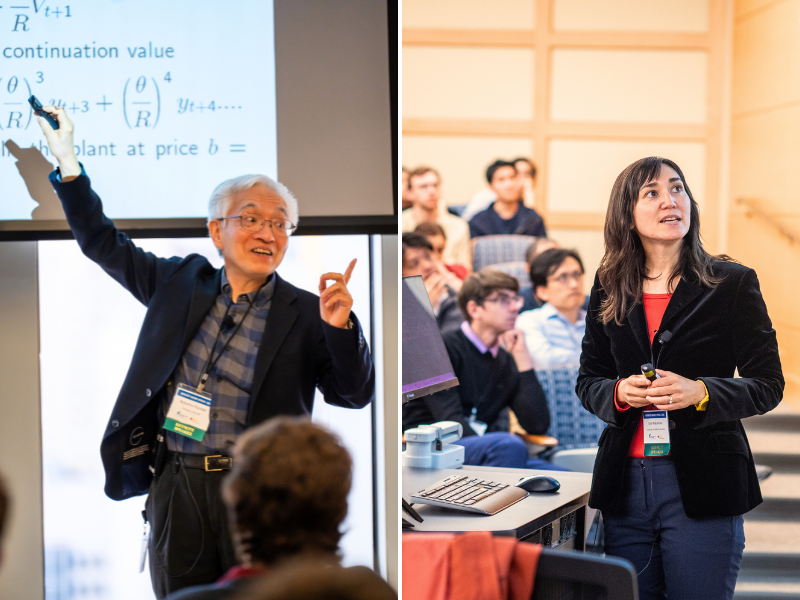Economic minds gather: The 2024 Midwest Macroeconomics Meeting comes to Richmond

By Megan Nash
From May 17 to 19, Richmond became a center of economic thought as it hosted the 2024 Midwest Macroeconomics Meeting. Jointly organized by the VCU School of Business and the Federal Reserve Bank of Richmond, the conference drew over 200 participants from around the world.
The Midwest Macroeconomics Meeting has a storied history, dating back to its inception in 1995 as a regional conference with 36 submissions and presentations.
Initially hosted at Michigan State University, the conference was founded by economists Ping Wang, Ph.D., professor of economics at Washington University, St. Louis; Gerhard Glomm, Ph.D., professor of economics at Indiana University; and Mario Crucini, Ph.D., professor of economics at Vanderbilt University.
The meeting was created as a platform for Ph.D. candidates to share their research, exchange ideas, and foster collaboration. Over the years, it has evolved into a significant semi-annual event, rotating through universities and regional Federal Reserve Banks not only in the Midwest but across the United States.
Planning for the Richmond event began in January 2023, led by Chris Herrington, Ph.D., associate professor of economics at VCU Business, and Grey Gordon, Ph.D., senior economist at the Federal Reserve Bank of Richmond.
“One of our first tasks was inviting colleagues to serve on the program committee,” said Herrington. “It was important to us that the committee represented the macro community around Richmond and Central Virginia.” The team assembled experts and colleagues from various institutions across central Virginia, including the University of Richmond, William & Mary and UVA.
The event opened at the Federal Reserve Bank of Richmond with paper presentations and a keynote address by Nobuhiro Kiyotaki, Ph.D., a distinguished and award-winning professor of Economics and Banking at Princeton University.
Over the next two days, sessions at the VCU School of Business included research presentations on monetary and fiscal policy, health care, education, trade, labor, housing, credit and research and development.
A second keynote address by Emi Nakamura, Ph.D., chancellor’s professor of Economics from the University of California, Berkeley, closed out the event.
“Having such incredible keynote speakers was instrumental for generating interest in the conference and recruiting the overwhelming number of high-quality paper submissions,” said Herrington. “The macroeconomists presenting their work at this conference are working on a wide range of topics, and so we sought keynote speakers whose research record and remarks would appeal to a diverse group.”
A key theme of the conference was its role in nurturing early-career researchers. In a joint conversation, co-founders Gerhard Glomm and Ping Wang discussed opportunities the conference offers:
“This is really for young people to get feedback, to show what they’re doing, to advertise and to get comments,” said Glomm. “The work actually goes on at the receptions, at dinner, over a beer or two, because the people that are here, that is their passion.”
Wang highlighted the meeting’s importance for scholars. “This is a platform for Ph.D. candidates to show their culpability, how talented they are and how they can interact with other people. They come up with new ideas and meet potential future employers.”
Celebrating the achievements of its researchers, student paper awards were presented to two outstanding economists.
First place, with a $1,000 award, went to Kevin Hunt, a fifth-year economics Ph.D. student at the University of Wisconsin-Madison, for his paper “Long-Term Employment Contracts for Earnings and Hours.” The second-place award of $500 was given to William Jungerman, an economics Ph.D. candidate at the University of Minnesota, Twin Cities, for his paper “Dynamic Monopsony and Human Capital.”
The conference saw a record 678 papers submitted, with 174 accepted, resulting in an acceptance rate just over 25%. A 17-member program committee ensured rigorous selection.
“Throughout this process, our number one priority was selecting the best research papers possible,” said Herrington. “In doing so, we were also mindful to maintain a balance of papers across topics and to include a mix of researchers at various career stages, from graduate students to seasoned and experienced faculty.”
Hosting the Midwest Macroeconomics Meeting at VCU not only boosted the university’s profile but also facilitated dialogue between researchers and policymakers.
“More than one-third of the attendees at this conference are affiliated with government agencies, central banks of various countries and international organizations like the International Monetary Fund (IMF) and World Bank,” Herrington explained.
When asked how the interaction between these two groups can potentially inform policy decisions, Glomm said, “Economics is about life—all the struggles that we face, all the difficult choices, the easy choices, our successes, our failures. The work we do here really lays the foundation for policymakers if they’re honest and benevolent enough to say, ‘this is what the best scholarship says, this is what we should do for the betterment of our country.’”
Reflecting on the impact of the event, Herrington noted, “Hosting this conference certainly raises our profile within the macroeconomic research community. It brings our researchers into the spotlight and helps the profession recognize the important work we are doing.”
Looking ahead, the 30th anniversary of the Midwest Macroeconomics Meeting will be held at Purdue University in fall 2024, followed by its spring appearance in Kansas City in spring 2025.
Categories News